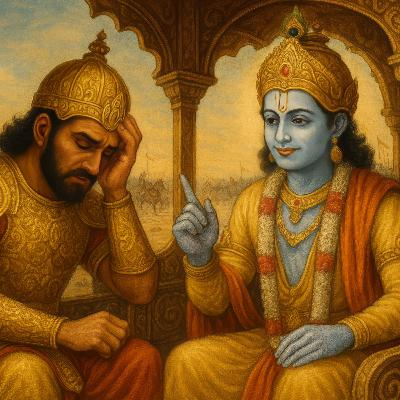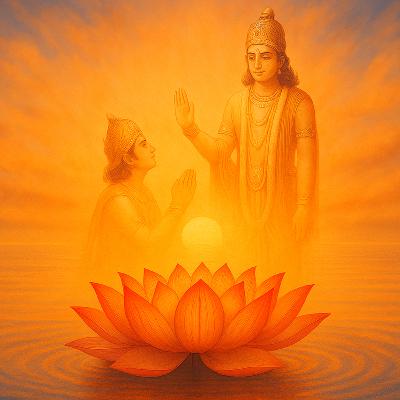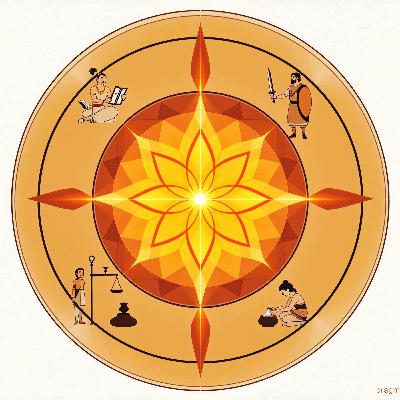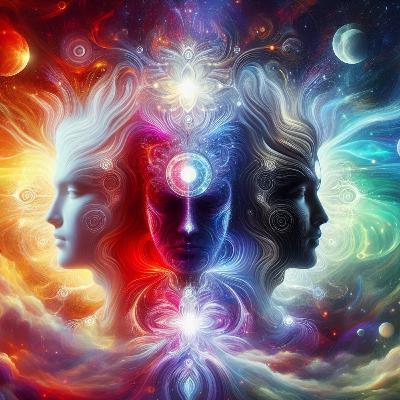Discover Pragmatic Bhagavad Gita: Unlocking the Practical Wisdom of the Bhagavad Gita with Krsnadaasa
Pragmatic Bhagavad Gita: Unlocking the Practical Wisdom of the Bhagavad Gita with Krsnadaasa

Pragmatic Bhagavad Gita: Unlocking the Practical Wisdom of the Bhagavad Gita with Krsnadaasa
Author: krsnadaasa
Subscribed: 5Played: 227Subscribe
Share
© krsnadaasa
Description
Discover the life-changing wisdom of the Bhagavad Gita with Krsnadaasa, a pragmatic spiritualist. Through profound yet practical teachings, unlock your true potential and find inner peace. Inspired by great spiritual masters, Krsnadaasa presents Krishna's authentic messages in a relatable way, empowering you to transform your life and contribute to a more compassionate world. Embark on a journey of self-discovery and spiritual awakening that transcends time and culture. Experience the transformative power of practical spirituality in your daily life.
137 Episodes
Reverse
Join us on a transformative journey through the Bhagavad Gita as we explore the profound wisdom of transcending delusion. In this enlightening podcast, we delve into the teachings of Lord Krishna, who guides Arjuna on the path to spiritual liberation by overcoming the confusion and attachments that bind us to material existence.Discover the key to attaining a steadfast intellect, known as Stithaprajnya, and learn how to navigate the dense forest of delusion, or Moha Kalilam. Krishna’s teachings in verses 2.51-2.54 illuminate the path of Buddhi Yoga, emphasizing detachment from the fruits of our actions as a way to rise above desires and achieve clarity. By aligning with Krishna’s divine wisdom, we can cultivate equanimity (samatvam) and steady our intellect to transcend life's distractions.Through the insights of renowned spiritual masters like Swami Vivekananda and Adi Shankaracharya, we explore the importance of transcending delusion in the pursuit of spiritual growth. Practical guidance is offered on how to perform duties without attachment, cultivate clarity, and develop unwavering wisdom.This episode also addresses Arjuna's poignant question about recognizing a Stithaprajnya, one who has transcended delusion and achieved a steady state of wisdom. Krishna explains that true spiritual attainment resides within and cannot be judged by external appearances. Drawing inspiration from examples like Ramana Maharshi, we highlight how inner transformation is the essence of spiritual growth.Join us on this illuminating journey as we unravel the transformative power of Krishna’s timeless teachings. Discover how to break free from the cycles of confusion and attachment and embark on the path to spiritual liberation. With Krishna as your guide, learn how to achieve inner peace and steadfast wisdom through the practices of Karma Yoga, detachment, and surrender.Tune in now and take the first step toward overcoming the illusions that bind you, as we unlock the secrets to attaining clarity, equanimity, and liberation through the profound teachings of the Bhagavad Gita.krsnadaasa (Servant of Krishna)Full transcript can be found here: Chapter 2: Transcending Delusion: Sankhya Yoga: Shlokas 51 to 54 - Pragmatic Bhagavad Gita
Do you ever feel like you're just spinning your wheels? You’re working hard, trying to do the right thing, but you still end up feeling stressed, anxious, and bound by the results of your actions. What if there was a way to act with perfect excellence that actually liberated you instead of binding you further?In the Bhagavad Gita, Shri Krishna reveals this profound secret to Arjuna on the battlefield. He calls it Kaushalam, a divine skillfulness that transforms work into worship. This isn't just about being good at your job; it's about mastering the art of Kaushalam in every part of your life.In This Episode, You'll Discover:The true meaning of yogaḥ karmasu kauśalam (Gita 2.50) and how it redefines "yoga" for the modern world.How Samatvam (equanimity) is the essential first step. We'll explore what it really means to be "equal in success and failure" without becoming a robot.Why Shri Krishna calls people who chase results "miserly" and how to escape this poverty-consciousness.The "two hands" of the spiritual archer. We'll use the beautiful analogy from the text to understand how Buddhi Yoga (the hand of skill) and Surrender (the hand of release) must work together.The revolutionary idea that a skillful person transcends both good and bad karma.Practical ways to start practicing the art of Kaushalam today, whether you're in a boardroom or washing dishes.This conversation dives deep into the heart of Karma Yoga. We'll connect the dots between verse 2.48's call for equanimity, verse 2.49's refuge in Buddhi (intelligence), and verse 2.50's ultimate promise of Kaushalam. This is the path from being a "reactor" to life to becoming a conscious, skillful creator of your own experience.Join me as we learn how to stop being victims of our actions and start becoming masters of this divine, liberating skill.krsnadaasa (Servant of Krishna)https://pragmaticgita.com
Have you ever done something for someone, expecting a 'thank you,' and felt a sting of resentment when you didn't get it? Does the pressure to succeed at work make you tense and irritable with the people you love? The root of this suffering is a simple, hidden transaction: we believe our actions are only valuable if they produce the results we want.In this episode, we unlock a secret from the Bhagavad Gita (verses 2.45-2.47) that can heal this exact problem. It's the life-altering philosophy of The Gift of Action. This isn't about becoming passive or passionless; it's about discovering a way to act with immense power and love, completely free from the anxiety of expectation.In This Episode, You'll Discover:The true meaning of "Karmanyevadhikaraste" and how it can liberate you from the anxiety of expectation. How to stop "keeping score" in your actions and relationships, leading to deeper, more authentic connections.The profound psychological shift from seeing your work as a transaction to seeing it as a sacred offering.The surprising way that selfless service quiets your inner critic and builds unshakeable self-worth.Practical steps to start practicing The Gift of Action in your family and workplace today, inspired by the selfless work seen in nature, like a hummingbird that sings for the joy of singing, not for an audience. Imagine a life where every action you took was a gift, given freely, without a price tag. How would that change your relationship with your work, with your loved ones, and with yourself? Join me to explore how this timeless wisdom can bring profound peace and purpose to your modern life.krsnadaasa(Servant of Krishna)https://pragmaticgita.com
Does it ever feel like your mind is being pulled in a hundred different directions at once? It can leave you feeling totally drained and without any real direction. Have you ever done all the "right" things to be successful, only to feel like real happiness is still just out of reach? In the middle of all our modern chaos, the ancient wisdom of the Bhagavad Gita gives us a powerful anchor. Shri Krishna shows us a path that isn't about running away from the world. It's about mastering how we live in it by using the power of an awakened intellect.In This Episode, You’ll Discover:The huge difference between just knowing something and truly living it, and why getting this is the first real step to freedom.The secret of the "one-pointed mind," and how you can focus your energy like a laser to burn through your problems instead of just burning out.Shri Krishna's incredible promise that no sincere spiritual effort you make is ever wasted, and how even five minutes of practice can create a permanent positive change in your life.How to spot and steer clear of the subtle trap of "spiritual materialism," which is when the ego sneakily uses spiritual practices for its own selfish gain.The timeless story of Nachiketa, a young boy who stood up to the Lord of Death and turned down every worldly temptation just to find the ultimate truth. He's the perfect example of what a resolute mind looks like.Shri Krishna's talk with Arjuna isn't just some old story; it's a personal guide for every one of us facing our own daily battles. He uses a beautiful metaphor of a chariot to explain what's going on inside us. Our body is the chariot, our senses are wild horses, the mind is holding the reins, but our intellect is the charioteer. If that charioteer is awake, focused, and knows where it's going, the journey is smooth and has a purpose. But if the charioteer is asleep or distracted by every shiny object on the side of the road, the horses will run wild and crash. This episode is all about how you can wake up your inner charioteer.Are you ready to stop chasing things that don't last and start building a life of real peace and purpose? What's one distraction you could let go of today to take that first step?krsnadaasa(Servant of Krishna)https://pragmaticgita.com
The Hidden Code That Transforms Sin Into LiberationWhat if I told you that the difference between sinful and virtuous action has nothing to do with the action itself? Mind-blowing, right? Today, we're cracking open one of spirituality's most practical secrets – the formula for sinless action hidden in Bhagavad Gita verse 2.38.In This Episode, You'll Discover:• The exact mental formula that prevents actions from creating negative karma• Why the same action can either bind you or free you (with real examples)• The three pairs of opposites you must master for sinless action• How emotional attachment creates sin, not the action itself• Practical techniques to purify any action before you take it• The difference between avoiding action and transforming actionLet me paint you a picture: Arjuna, legendary warrior, stands paralyzed on the battlefield. His fear? Not death, but sin. "How can I fight my own family? Surely this action will damn me!" Sound familiar? Maybe you've felt this way about a difficult decision – damned if you do, damned if you don't.Krishna's response flips everything on its head. He reveals that what makes action sinful according to Gita isn't the action itself but the mental state behind it. As verse 2.38 states: "Fight for the sake of duty, treating alike pleasure and pain, gain and loss, victory and defeat. Fulfilling your responsibility in this way, you will never incur sin."Here's the game-changer: Sin comes from acting with a disturbed, attached mind. When you chase pleasure or flee pain, when you grasp for gain or fear loss, when you crave victory or dread defeat – that's when actions create bondage. But perform the exact same action with a balanced mind? It becomes dharmic action, creating no karmic residue.I love how the text uses the metaphor of an actor. A skilled actor plays both hero and villain with full commitment, yet never confuses themselves with the role. Similarly, we can engage fully in life's drama while maintaining inner freedom. This is the essence of action without karma.The practical magic happens when you apply this before any major decision. Instead of agonizing over outcomes, you consciously balance your mind first. You ask: "Am I acting from desire or duty? From disturbance or stability?" This simple shift transforms potentially binding actions into liberating ones.Modern psychology confirms what yogis knew millennia ago – that the space between stimulus and response contains our freedom. The formula for sinless action teaches us to expand that space, to choose our response from wisdom rather than reactivity.Here's my challenge for you: Before your next difficult action, pause. Balance your mind regarding the possible outcomes. Then act from that place of equilibrium. Watch how the quality of your action transforms.Remember, you don't need to fear action when you understand this formula. Every moment becomes an opportunity to practice sinless action, to engage fully while remaining free.krsnadaasa(Servant of Krishna)https://pragmaticgita.com
What if I told you that every choice you make is either binding you or freeing you? Today we dive deep into the profound relationship between dharma and karma—two forces that shape every moment of our existence according to the Bhagavad Gita's timeless wisdom.In This Episode, You'll Discover:Why dharma and karma are inseparable aspects of one cosmic lawHow understanding dharma and karma transforms daily challenges into spiritual opportunitiesThe three types of karma and how they interact with your dharmaReal-life examples showing how dharma and karma work together in modern contextsWhy Krishna says abandoning dharma creates the worst kind of karmaPractical ways to align with dharma and karma for spiritual liberationPicture this: Arjuna, the greatest warrior of his age, trembles on the battlefield, paralyzed by the thought of fighting his own family. Haven't we all been there—knowing what's right but feeling unable to act? Krishna's response cuts straight to the heart of dharma and karma: "Looking at your own duty, you should not waver."Through powerful stories, we explore how dharma and karma operate in everyday life. You'll hear about two warriors, Arjuna and Karna, who faced similar hardships but made different choices. Their parallel journeys reveal how dharma and karma work together: while circumstances (prarabdha karma) may be similar, our choices (kriyamana karma) to follow or abandon dharma create entirely different destinies.We'll unpack the beautiful story of the wall—where a young boy's simple act of writing becomes either vandalism or virtue depending on alignment with dharma. This tale perfectly illustrates how dharma and karma are not about the action itself but about the consciousness behind it. When we align with divine will, even difficult actions create liberating karma.The episode explores how dharma and karma resolve the modern struggle between worldly success and spiritual growth. You'll understand why a mother's selfless service, a doctor's compassionate healing, or an entrepreneur's ethical business all become yoga when performed as dharma. The secret? Understanding that dharma and karma don't pull in opposite directions, but rather they're partners in our evolution.Perhaps most powerfully, we examine what happens when we abandon our dharma. It's not about divine punishment but natural law, just as a musician who refuses to play their part disrupts the entire orchestra, abandoning our dharma creates ripples of negative karma that bind us to suffering. Yet Krishna also reveals the hope: through understanding dharma and karma, we can transform even the heaviest karmic burdens.This isn't just philosophy, it's practical wisdom for today. Whether you're facing ethical dilemmas at work, family conflicts, or personal crises, the principles of dharma and karma light the way forward. Your battlefield may not be Kurukshetra, but your choices matter just as much.Remember: dharma and karma are calling you to rise. Not tomorrow, not when you feel ready, but right now in whatever situation life has presented. Your dharma is your unique way of serving the cosmic harmony. Your karma is the power you have to shape your destiny through conscious choice.The question isn't whether you'll face difficult choices, because you will. The question is whether you'll understand how dharma and karma work together to transform those choices into stepping stones toward liberation.May the wisdom of dharma and karma guide you to live with courage, purpose, and unwavering commitment to truth.krsnadaasa(Servant of Krishna)https://pragmaticgita.comNotes for complete episode can be found here: https://pragmaticgita.com/karma-and-dharma-shlokas-31-to-37/
Facing Death with Wisdom Why do we fear death so intensely? Why does the loss of loved ones bring such unbearable grief? In this episode of the Pragmatic Gita Podcast, we journey through verses 2.25–2.30 of the Bhagavad Gita, where Krishna teaches Arjuna about the Unmanifested, Unthinkable, Unchangeable Eternal Soul.Why Krishna calls the soul avyaktaha (unmanifested), achintyaha (unthinkable), and avikaryaha (unchangeable).How the cycle of birth and death never touches the Unmanifested, Unthinkable, Unchangeable Eternal Soul.The meaning of sarva-gata—the soul as all-pervading, existing everywhere and always.The wonder of the soul: why some see it as a marvel, some hear of it but never understand it.How samskaras (mental impressions) silently shape karma and destiny.The simple but profound way to transform samskaras through bhakti yoga.Krishna explains that the soul is beyond perception, beyond the grasp of senses and intellect. The Unmanifested, Unthinkable, Unchangeable Eternal Soul is invisible to material eyes and inconceivable to thought, yet it is the truest reality within us. Just as a map can never capture the richness of a city, our concepts can never capture the full essence of the soul.Even when we cling to the belief that the soul is born and dies, Krishna’s wisdom still applies: death is certain for the born, and birth is certain for the dead. Life moves in cycles, but the Unmanifested, Unthinkable, Unchangeable Eternal Soul remains untouched, indestructible, and eternal.To bring this teaching alive, we recall Yudhishthira’s dialogue with Yama in the Mahabharata. When asked what is most surprising in this world, Yudhishthira replies: every day beings die, yet the living believe they are immortal. This paradox shows why Krishna urges Arjuna—and us—not to grieve over what is inevitable, but to focus on realizing the eternal.The Gita also links this wisdom to samskaras. Our impressions form habits, and habits create karma. Negative samskaras bind us in suffering, but Krishna gives hope: through devotion, even the most sinful person can transform and awaken to the Unmanifested, Unthinkable, Unchangeable Eternal Soul.Closing Thought: Death cannot destroy us. The Unmanifested, Unthinkable, Unchangeable Eternal Soul is indestructible, timeless, and beyond sorrow. By cultivating devotion and refining samskaras, we align with our eternal essence and step closer to liberation.krsnadaasa(Servant of Krishna)https://pragmaticgita.com
Complete text can be found here: https://pragmaticgita.com/ayam-sanatanaha-the-causeless-eternal-soul/ Ayam Sanatanaha. What does this ancient phrase from the Bhagavad Gita mean? It holds a secret to overcoming our deepest fears and answering life's most profound question: "Who am I?" It is a declaration that your true self is eternal, primordial, and has no cause.In This Episode, You'll Discover:The deep meaning of the Sanskrit phrase Ayam Sanatanaha - the causeless, eternal soul.Why the Gita describes the soul (Atman) as unborn, and how this establishes its eternal nature.A clear explanation of why the soul is considered indestructible, beyond the reach of any physical harm.How this single realization can dismantle the five core afflictions (kleshas) that cause all human suffering, especially the fear of death.An introduction to the yogic paths that serve as a practical roadmap for experiencing this truth directly.The timeless analogy of the soul changing bodies like we change clothes, reframing our perspective on life and death.In this discussion, we journey to the very heart of Sanatana Dharma teachings to uncover a truth that liberates. We often live our lives identified with our temporary roles, our bodies, and our minds. We feel the sting of every loss and fear every ending. But the wisdom of "Ayam Sanatanaha" invites us to identify with something infinitely more vast and stable. It tells us that the soul transcends the body and mind.This is not just philosophy; it is a blueprint for a fearless existence. Join us as we explore how to shift our identity from the fleeting to the eternal, and in doing so, find the unshakable peace that is our very nature.krsnadaasa(Servant of Krishna)https://pragmaticgita.com
Life often feels like an unpredictable ocean, tossing us between the high waves of success and the deep troughs of failure. This endless cycle of pleasure and pain can leave us feeling drained and searching for solid ground. But what if you could find an unshakeable anchor right in the middle of that storm?In this episode, we journey into the heart of the Bhagavad Gita to uncover a timeless secret: the art of equanimity. Guided by the profound words of Shri Krishna on the battlefield, which is a powerful metaphor for our own internal struggles. We explore a spiritual technology for mastering our mind and discovering a peace that cannot be disturbed. We’ll explore one of the most practical lessons from the Gita, where Shri Krishna reveals a surprising truth: our suffering doesn’t come from the world itself, but from the fleeting feelings of happiness and distress created by our senses. He explains that these experiences all share three qualities: they appear, they disappear, and they are temporary. This episode unpacks why trying to cling to pleasure and run from pain is a futile chase that only creates more suffering, and we’ll discuss Krishna’s powerful solution: learning to gracefully endure them both.This is a practical guide for a resilient life. We’ll talk about the crucial difference between the eternal Self and the temporary body, learning that our true nature is an indestructible anchor in a changing world. You will learn how to be like a mighty oak tree in a storm, swaying with the fierce winds of life while remaining deeply and immovably rooted. We’ll also touch on the "Eight Worldly Winds" described by Lord Buddha (praise and blame, success and failure, pleasure and pain), and see how a balanced mind is our ultimate shield.In a world that constantly pulls for our attention, the ability to remain centered is not a luxury, but a necessity. Shri Krishna teaches that a person who remains steady through happiness and distress is the one who becomes truly free. This episode is your first step on a journey toward inner wisdom, helping you accept what you cannot change and find the courage to act with purpose.krsnadaasa(Servant of Krishna)https://pragmaticgita.com
Have you ever felt completely stuck, trapped in a mental maze of overthinking? This state, where endless analysis leads to no action, has a modern name: "analysis paralysis." Yet, this is an ancient human predicament. On the grand battlefield of Kurukshetra, the mighty warrior Arjuna found himself in this exact state, overwhelmed by grief, doubt, and fear, incapable of action. But his crisis became the stage for one of history's most profound teachings, delivered by Sri Krishna.In this episode, we journey to the heart of this sacred moment. We witness Sri Krishna, with a serene and gentle smile, begin to dismantle Arjuna's confusion. He starts not with a command to fight, but with a revolutionary truth designed to reframe reality itself: the eternal nature of the soul. We will explore Krishna's opening teachings from verses 2.11 to 2.13 of the Bhagavad Gita , which declare that the wise grieve for neither the living nor the dead because the essence of who we are can never cease to be.We'll dissect this timeless wisdom through multiple lenses:Buddha's Concept of Papanca: Discover the ancient Buddhist term for the mind's tendency to create suffering through endless mental chatter, illustrated by the powerful parable of the poisoned arrow.The Science of Consciousness: Explore how modern science, as highlighted by Dr. Deepak Chopra, inadvertently supports these ancient truths. Learn how your body’s cells are in constant renewal, yet your sense of self remains, pointing to a consciousness that is unchanging.The Soul's Journey: Understand Krishna's logical explanation that just as we pass from childhood to youth to old age in one body, the soul similarly passes to another body at death.This isn't just a philosophical discussion; it's a practical guide to overcoming the most fundamental human fears. In an age of information overload and existential anxiety, these teachings offer a stable foundation. By understanding the eternal nature of the soul, you can learn to navigate life's "battlefields" with the same calm composure as Krishna. This episode provides the tools to move from confusion to clarity, from fear to fearlessness, and from paralysis to purposeful action. Join us as we uncover the secret to transforming your perspective on life, death, and your own immortal identity.krsnadaasa (Servant of Krishna)
Discover Your Inner Saboteur Through Ancient WisdomIn this groundbreaking episode, we explore how the Bhagavad Gita's second chapter reveals the inner saboteur, that destructive voice within us all that whispers "You're not good enough," "Why even try?" and "You'll fail like always." Through the dramatic confrontation between Arjuna and Krishna on the battlefield of Kurukshetra, we uncover timeless techniques for recognizing and defeating this internal enemy.What happens when the greatest warrior of his age collapses in tears, paralyzed by his own mind? Krishna's response isn't sympathy, but it's what modern psychology calls a "pattern interrupt." You'll discover why Krishna declares "This weakness doesn't suit you!" and how this apparent harshness is actually the deepest compassion. Learn how the inner saboteur operates like a skilled thief, losing its power the moment we catch it in action with our awareness.This episode introduces "Pragma 1: Recognize the saboteur within you. Don't give in to it. Confront it and vanquish it." We decode Sanskrit terms like "kashmalam" (spiritual contamination) and "klaibyam" (impotence of character) to understand how our inner saboteur manifests in modern life, from workplace anxiety to relationship avoidance to personal growth paralysis.Through interactive exercises and real-world applications, you'll learn:How to catch your inner saboteur in action using awareness techniquesThe difference between being the witness of negative thoughts versus identifying with themWhy firm guidance sometimes serves us better than sympathyHow to transform "I am weak" into "A thought of weakness is arising"Practical applications for conquering the inner saboteur in workplace challenges, difficult conversations, and personal developmentJoin us as we journey through verses 2.1-2.3 of the Bhagavad Gita, where Krishna reveals that our true nature isn't temporary weakness but eternal strength. Whether you're facing your personal Kurukshetra or simply tired of self-defeating patterns, this episode offers both profound philosophy and practical tools for silencing your inner saboteur once and for all.krsnadaasa (Servant of Krishna)
From Crisis to Clarity: Conquer the 'Dhritarashtra Element' & Get Your BreakthroughHave you ever felt that your world was ending, only to find it was the beginning of something new? The Bhagavad Gita, a cornerstone of spiritual wisdom, begins precisely in this moment of crisis. It teaches us that the darkest part of the night is just before sunrise, and our most profound breakdowns are often the fertile ground for our greatest breakthroughs.In this episode, we explore the raw, human experience of Arjuna on the battlefield of Kurukshetra. You'll witness his collapse not as a warrior's weakness, but as a necessary emptying of the ego to make space for grace. We’ll delve into the powerful insights of great spiritual masters, or acharyas, to understand the deeper meaning:Swami Chinmayananda reveals the core of our inner conflict: the ‘Dhritarashtra element’. This is the spiritually blind, delusional aspect within each of us that clings to "my people" over righteousness, preventing us from seeing the truth clearly.Swami Prabhupada explains that Arjuna's physical symptoms—his trembling body and drying mouth—arise from a deep attachment to bodily relationships, a direct consequence of this inner blindness obscuring his duty and understanding of the eternal soul.We will dissect how the ‘Dhritarashtra element’ leads to Arjuna’s state of vishada, or despair, setting the stage for the most sublime spiritual instruction.Arjuna's condition is a classic example of what mystics call the 'Dark Night of the Soul', a period of spiritual desolation that, while painful, is essential for growth. As one powerful anecdote illustrates, a butterfly that is "helped" out of its cocoon emerges too weak to fly, because it was denied the very struggle that builds strength. Our struggles, born from our own This chapter is a masterclass in transforming crisis into clarity. It teaches that when we feel most lost, that is the perfect opportunity to turn toward the divine. Join us to learn how to identify and overcome the ‘Dhritarashtra element’ within, so your personal battlefield can become a field of righteousness, leading to your own spiritual evolution.krsnadaasa (Servant of Krishna)
Are you standing at a crossroads, overwhelmed by life's battles? Do you yearn for deeper meaning amidst the chaos of the modern world? Five thousand years ago, a great warrior named Arjuna faced this same paralysis on the eve of a great war. The timeless wisdom he received from Lord Krishna in that moment of crisis was a gift to all humanity. This is the Bhagavad Gita, the "Song of God," and its teachings are as relevant today as they were millennia ago. Join me, krsnadaasa, not as a saint or swami, but as a humble, practical-minded devotee who has spent two decades applying these principles to the battlefield of daily life. This is not just another podcast on ancient philosophy. This is an invitation to an inner revolution. In this introductory episode, we explore:The Universal Battlefield: Discover the Kurukshetra that exists within each of us and the eternal struggle between our higher and lower selves. Timeless Questions: The Gita addresses the questions that haunt every human heart: "Who am I? Why do I suffer? What is my purpose?" A Practical Path: Learn why the Gita is considered a yoga shastra—a practical science for transforming your life through action, devotion, knowledge, and meditation. The Power of Shared Journey: Understand how learning together in a community (satsanga) can accelerate spiritual growth and provide the strength to overcome any obstacle. If you have ever felt lost, confused, or are simply seeking something more real and true, this journey is for you. Together, let's unlock the profound, transformative wisdom that has guided countless souls from despair to clarity. Are you ready to receive the answers that have been waiting for you? Hare Krishna!krsnadaasa(Servant of Krishna)
Registration link for the new batch of Bhagavad Gita live sessions: https://pragmaticgita.com/registration-for-the-3rd-batch-of-bhagavad-gita-classes/Unlock Krishna's Final Teaching: The Ultimate Spiritual Transformation GuideKrishna's Final Teaching represents humanity's most precious spiritual inheritance, twelve revolutionary verses (18.67-18.78) that transform seekers into teachers and create eternal chains of divine wisdom. This comprehensive Krishna's Final Teaching guide for seekers reveals how gita's concluding gift establishes timeless principles for authentic spiritual growth, knowledge protection, and lasting transformation that modern seekers desperately need.Krishna's Final Teaching wisdom doesn't simply conclude the Bhagavad Gita, it launches an infinite mission of spiritual awakening. Through these profound Krishna's closing instructions, discover why sacred knowledge requires careful protection, how teaching becomes the supreme act of devotion, and why simple listening with faith can liberate any sincere soul. Learn the revolutionary concept that study itself becomes worship through the "yajna of knowledge."Within Krishna's Final Teaching lies the beautiful principle of "sacred groove wisdom", illustrated through Saint Tukaram's pebble, worn smooth by countless repetitions of the divine name. This gita's concluding gift reveals how consistent Krishna's Final Teaching practice literally carves transformative pathways in consciousness, making each encounter with divine truth more powerful and life-changing. Modern neuroscience confirms what these ancient teachings understood about repetitive spiritual disciplines reshaping our very brain structure.Krishna's Final Teaching wisdom presents a stunning paradox: while spiritual knowledge must be carefully guarded from the unprepared (those lacking austerity, devotion, willingness to listen, or harboring divine envy), it simultaneously offers liberation to anyone approaching with genuine faith. These practical Krishna's Final Teaching lessons demonstrate that protective boundaries actually serve compassion, ensuring wisdom reaches fertile hearts while preventing spiritual harm.Witness the culmination of Krishna's Final Teaching transformation through Arjuna's humble acknowledgment: "by Your grace my delusion is gone, my memory restored." His response provides the perfect template for authentic spiritual awakening—complete attribution to divine grace rather than personal accomplishment. Experience Sanjaya's hair-raising testimony as objective validation that proximity to sacred knowledge transmission Gita creates measurable spiritual effects.Gita's concluding gift culminates in Sanjaya's magnificent declaration: wherever Krishna (divine consciousness) and Arjuna (surrendered devotion) unite, prosperity, victory, power, and righteousness inevitably follow. This eternal law offers modern seekers assurance that implementing Krishna's Final Teaching practice guarantees spiritual success in any endeavor through proper divine alignment.Your servant in Krishna consciousness,krsnadaasa (Servant of Krishna)
Embracing the Power of Surrender in the Bhagavad GitaWelcome to "Wisdom for the Ages." In the climactic final teachings of the Bhagavad Gita, Shri Krishna reveals the ultimate path to freedom, a concept encapsulated in a single, powerful Sanskrit word: Sharanagati. This is more than just a philosophical idea; it is a systematic path for transforming our consciousness, a direct response to the profound despair and confusion that gripped Arjuna on the battlefield. It is the secret to moving from anxiety-ridden effort to a life of grace, purpose, and love.What You’ll Discover in This Episode:In this episode, we explore Sharanagati, the art and science of complete surrender as taught by Shri Krishna. We'll unpack why this teaching is considered "the most confidential of all" and how it resolves the timeless struggle between human effort and divine will. You will be guided through the six distinct stages of Sharanagati, a practical framework for anyone seeking to apply these profound truths in modern life. We will discuss:Accepting what is pleasing to the divine will (Anukulyasya Sankalpa).Rejecting what is displeasing (Pratikulyasya Varjana).Cultivating unshakeable faith that the divine will protect you (Raksisyatiti Visvasa).Formally accepting God as your protector (Goptrtve Varana).The act of complete self-offering (Atma-niksepa).Embracing total dependence and humility (Karpanya).Why Listen Now?Do you ever feel that your spiritual practices lead to more striving than peace? The path of Sharanagati dismantles this paradigm. It reveals how the power of surrender liberates us from the anxiety of outcomes. We’ll explore the deep psychology behind this teaching, connecting it to the modern concept of "secure attachment". When we truly understand that we are the recipients of unconditional divine love, our actions cease to be fueled by fear and instead become joyful expressions of gratitude. This is the promise of Sharanagati—a shift from seeking love to realizing you are already beloved, transforming every part of your life.krsnadaasa (Servant of Krishna)
What You'll Discover in This Stepwise Spiritual Transformation JourneyHave you ever wondered how a time-honored scripture can guide you toward lasting peace by unfolding one step at a time? In this episode, we journey through Bhagavad Gita verses 18.49-18.55 to reveal the essence of stepwise spiritual transformation through Krishna's most confidential teachings. You will experience how Krishna's revolutionary 13-point approach for inner change provides clear, actionable steps to refine the intellect, master the mind, and cultivate deep devotion leading to liberation through love. Through engaging storytelling, like the analogy of a weary traveler learning to discern mirages from reality, you will understand how recognizing illusions frees you from endless desires and transforms suffering into permanent peace.In today's world of constant noise and distraction, the art of stepwise spiritual transformation offers a welcome path to rediscover balance and purpose. This episode presents ancient wisdom that remains remarkably relevant: an intellect free from attachment, a mind disciplined by systematic practice, and a heart overflowing with devotion. As we unpack verses that emphasize "asaktabuddhiḥ sarvatra" (unattached intellect), you will learn why letting go of ego, pride, anger, and greed forms the bedrock of any authentic stepwise spiritual transformation. Whether you feel overwhelmed by modern pressures or simply seek more meaning in daily life, these teachings will resonate deeply and provide manageable progression toward liberation through love.We begin by picturing Arjuna, the warrior paralyzed by doubt on the battlefield, a vivid reminder that each of us faces inner conflicts every day. As Krishna imparts his systematic guidance, we introduce the concept of stepwise spiritual transformation: buddhyā viśuddhayā (purifying the intellect), dhṛityā ātmānam niyamya (firmly controlling the mind), and śabda-ādīn viṣhayān tyaktvā (renouncing sense objects). Each of the 13 steps is illustrated with relatable examples, such as someone learning to pause before reacting when provoked, an essential practice for stepwise spiritual transformation. We weave in the fascinating parallels between this ancient systematic approach and modern psychology, demonstrating that stepwise spiritual transformation addresses contemporary issues like anxiety and existential meaninglessness.Discover practical methods, such as seeking solitude, moderating consumption, and cultivating daily meditation, to support your stepwise spiritual transformation. Learn why devotion ("mad-bhaktiṁ labhate parām") emerges naturally once the mind is purified through systematic practice, leading to ultimate liberation through love. Understand how all spiritual paths, karma yoga, jnana yoga, dhyana yoga, and bhakti yoga, converge into this unified stepwise spiritual transformation approach that transforms confusion into clarity through incremental change.If you have ever felt stuck in cycles of stress, regret, or restlessness, this episode offers a roadmap for lasting change through manageable stepwise spiritual transformation principles that ordinary people can use to achieve extraordinary inner growth.krsnadaasa (Servant of Krishna)
Achieving Liberation through Svadharma: Krishna's Revolutionary Path to Self-RealizationWhat You'll DiscoverIn this transformative exploration of Bhagavad Gita verses 18.41-18.48, we unveil the profound path of liberation through Svadharma--the revolutionary teaching that shows how embracing your natural duties becomes the gateway to spiritual freedom. Lord Krishna reveals to Arjuna that true liberation doesn't require abandoning the world but rather engaging with it through the lens of your authentic nature and divine service.This ancient wisdom demonstrates how liberation through Svadharma offers a practical alternative to traditional renunciation. Instead of viewing worldly responsibilities as obstacles to enlightenment, Krishna shows how performing our natural duties with devotion and detachment becomes the very means of transcendence. "By performing one's duties through their natural occupation," Krishna teaches, "one worships the Creator and attains perfection."The path of liberation through Svadharma recognizes four distinct temperaments within the Varanashrama framework, each offering unique opportunities for spiritual growth. Whether you're naturally inclined toward the Brahmin's path of wisdom and teaching, the Kshatriya's path of protection and leadership, the Vaishya's path of resource stewardship, or the Shudra's path of skilled service, your authentic nature becomes your vehicle for liberation.The revolutionary aspect of liberation through Svadharma lies in Krishna's declaration that "Better is one's own duty, though imperfectly performed, than the duty of another well performed." This teaching liberates us from the spiritual comparison trap, affirming that your unique path, however humble it may appear, offers the most direct route to self-realization.In our modern world of career confusion and spiritual seeking, liberation through Svadharma provides urgently needed clarity. This podcast reveals why so many feel spiritually unfulfilled despite following conventional wisdom about success and achievement. When we attempt to live someone else's dharma, we create internal conflict that blocks our natural flow toward liberation.Through Krishna's fire-and-smoke analogy, you'll discover why every sincere effort aligned with your nature carries transformative power, even when it appears imperfect. The teachings include practical methods for:Recognizing your authentic temperament and callingTransforming daily activities into spiritual practiceFinding deep fulfillment through aligned actionAchieving psychological flow and inner peaceLiberation through Svadharma reveals that we need not choose between worldly engagement and spiritual freedom. When we align our outer activities with our inner nature and offer all results to the divine, ordinary life becomes extraordinary, and each moment offers an opportunity for transcendence.Discover how this timeless wisdom can guide you to authentic success, inner peace, and ultimate liberation.~ krsnadaasa (Servant of Krishna)
The Science of Happiness – Ancient Wisdom Meets Modern ResearchIn this enlightening episode, we explore the science of happiness as revealed in Bhagavad Gita verses 18.36 to 18.40. Lord Krishna outlines a sophisticated psychological map that categorizes joy into three distinct types: sattvic, rajasic, and tamasic. This ancient framework anticipates findings from neuroscience and positive psychology, offering profound insights that contemporary research is only beginning to understand. You’ll hear how Krishna's analogy of the Indian gooseberry—"bitter at first, sweet in the end"—mirrors the brain’s preference for delayed gratification over instant highs.Krishna’s description of sattvic happiness, which arises through self-knowledge and inner purification, finds strong support in modern neuroscience. Activities that demand effort in the beginning, like meditation or disciplined learning, light up parts of the brain linked to sustained wellbeing and inner contentment. This type of happiness feels challenging at first but nurtures deeper peace over time, establishing neural pathways that build lasting fulfillment rather than brief dopamine spikes.The Gita’s warning about rajasic happiness mirrors what psychologists now describe as the hedonic treadmill. Experiences like scrolling social media or chasing quick wins offer an initial rush, followed by emptiness and fatigue. Krishna called this "like nectar at first, but like poison in the end." The science of happiness confirms that these patterns, driven by dopamine surges, lead to compulsive cycles of pleasure-seeking and regret.Tamasic happiness, the lowest kind, involves escapism, laziness, or self-deception. Modern research into procrastination and experiential avoidance shows how these behaviors offer short-term relief while increasing long-term disengagement and dissatisfaction. Krishna described this as a happiness that "covers the true nature of the Self," a sharp reflection of what cognitive scientists now observe in those trapped by fear and comfort.This episode bridges timeless spiritual wisdom with cutting-edge science to offer a unified perspective on what truly makes us happy. You’ll walk away with actionable insights for transforming short-term indulgence into sustainable joy, and for replacing anxiety-driven behavior with mindful awareness.Join us as we connect the ancient science of happiness with modern-day challenges, and discover a path that leads not just to feeling good, but to being whole.krsnadaasa (Servant of Krishna)
What You’ll DiscoverIn this episode, we explore a rarely discussed yet deeply transformative teaching from the Bhagavad Gita. Krishna presents a psychological map of Buddhi and Dhriti, referring to intelligence and determination. Through verses 18.29 to 18.35, he explains how these two inner faculties are shaped by the three gunas: sattva (purity), rajas (passion), and tamas (inertia). These forces silently influence every choice we make, from our goals to our moral compass.What makes this even more profound is Krishna’s insight that life’s struggles often stem not just from external circumstances, but from the quality of our discernment (buddhi) and the depth of our perseverance (dhriti). You will encounter powerful modern parallels, including corporate burnout and spiritual bypassing, that reveal how rajasic and tamasic tendencies impact our moral clarity and emotional stamina.In a world filled with constant stimulation, conflicting advice, and emotional exhaustion, our inner compass can easily falter. Moral relativism has blurred the lines of ethical integrity, and moral inversion, where falsehood is mistaken for virtue, is widespread. The question arises: how do we remain rooted in truth and inner strength amidst such turmoil?Krishna offers a timeless solution. By cultivating sattvic buddhi, we begin to see clearly. By strengthening sattvic dhriti, we remain firm in what is right. With practical and relatable examples, you will see how this guidance applies to everyday scenarios like social media habits, leadership decisions, and emotional resilience.• How tamasic buddhi glamorizes harm and clings to illusion• Why rajasic dhriti drives ambition but often ends in exhaustion• How sattvic dhriti sustains spiritual effort through adversity• Clear, actionable tools to purify both intellect and willWhether you are a spiritual seeker, a leader making tough calls, or someone simply looking for clarity and strength, this episode will give you a practical framework from Krishna’s teachings.🎧 Tune in and reconnect with your inner compass through the wisdom of Buddhi and Dhriti.With devotion,krsnadaasa (Servant of Krishna)
Unlock "The Guna Matrix": A Bhagavad Gita Exploration of Knowledge, Action, and the Doer (18.19-18.28)Have you ever felt like you're operating under different influences? One moment you're clear and focused (sattva), the next driven by a restless energy (rajas), or perhaps feeling sluggish and confused (tamas)? The ancient text of the Bhagavad Gita provides a powerful framework for understanding these fluctuations through what we can call The Guna Matrix – the systematic classification of reality based on the three modes of material nature.In this episode, we delve into the profound wisdom of Bhagavad Gita verses 18.19 to 18.28, where Lord Krishna reveals how these modes define our knowledge, action and doer of action. He breaks down how jnana, karma and karta are influenced by sattva, rajas, and tamas. This isn't abstract philosophy; it's a practical tool for self-understanding and navigating the complexities of life.What You'll Discover:Mapping "The Guna Matrix": Explore the detailed classification system presented by Krishna, which provides a diagnostic tool for understanding our current state of consciousness. The Threefold Nature of Experience: Gain clarity on how knowledge, action and doer of action manifest differently within each guna – sattva (goodness), rajas (passion), and tamas (ignorance). From the unity-seeing sattvic knowledge to the deluded tamasic doer, you'll see how these modes shape our experiences. Ancient Wisdom, Modern Relevance: Learn how the insights from The Guna Matrix offer Bhagavad Gita practical wisdom for self-assessment, making conscious decisions, and cultivating environments that support spiritual growth. Moving Beyond the Modes: Understand that recognizing The Guna Matrix is the first step towards transcending the gunas entirely, ultimately leading to liberation and pure spiritual consciousness. Why Listen Now?In a world that often feels chaotic, understanding The Guna Matrix provides a clear lens through which to view ourselves and the world around us. By recognizing the influence of sattva, rajas, and tamas on our jnana, karma and karta, we can make intentional choices to elevate our consciousness and experience greater peace and purpose. This episode offers invaluable Bhagavad Gita Chapter 18 insights that can empower you to navigate life's challenges with greater awareness.Dive deeper into the profound wisdom of the Bhagavad Gita and unlock the secrets of The Guna Matrix. Imagine living a life where you are less swayed by external forces and more aligned with your highest potential. Here's why understanding this ancient classification is crucial for anyone seeking authentic spiritual advancement.Join us as we explore these timeless teachings and their transformative power for a more conscious and fulfilling existence.krsnadaasa (Servant of Krishna)


![Pragmatic Gita : Chapter 2: Transcending Delusion [2.51 to 2.54] Pragmatic Gita : Chapter 2: Transcending Delusion [2.51 to 2.54]](https://s3.castbox.fm/66/87/a8/1232d753b0fbaf150f3eaaddecc2948314_scaled_v1_400.jpg)
![Pragmatic Gita: Chapter 2: The Art of Kaushalam [2.48 to 2.50] Pragmatic Gita: Chapter 2: The Art of Kaushalam [2.48 to 2.50]](https://s3.castbox.fm/6b/11/0c/b3046f10d6343ba34da197d13745410128_scaled_v1_400.jpg)
![Pragmatic Gita: Chapter 2: The Gift of Action [2.45 to 2.47] Pragmatic Gita: Chapter 2: The Gift of Action [2.45 to 2.47]](https://s3.castbox.fm/9f/88/f0/dd9c3a0fa3136f79390b903c1cb34ac0f8_scaled_v1_400.jpg)
![Pragmatic Gita: Chapter 2: Buddhi Yoga The Yoga of Wisdom and Discrimination[2.39 to 2.44] Pragmatic Gita: Chapter 2: Buddhi Yoga The Yoga of Wisdom and Discrimination[2.39 to 2.44]](https://s3.castbox.fm/7f/0e/84/665c2639bb33e7e89e0e3835c1365e3b37_scaled_v1_400.jpg)
![Pragmatic Gita: Chapter 2: Formula for Sinless Action [2.38] Pragmatic Gita: Chapter 2: Formula for Sinless Action [2.38]](https://s3.castbox.fm/4e/a6/6c/815a43c0e14114abd2b70e004274a652bf_scaled_v1_400.jpg)
![Pragmatic Gita: Chapter 2: Life Transforming Lessons on Dharma and Karma[2.31 to 2.37] Pragmatic Gita: Chapter 2: Life Transforming Lessons on Dharma and Karma[2.31 to 2.37]](https://s3.castbox.fm/f9/1c/86/b1be25b83f6bd53961993c5414fafe29e5_scaled_v1_400.jpg)
![Pragmatic Gita: Chapter 2: The Unmanifested, Unthinkable, Unchangeable Eternal Soul [2.25 to 2.30] Pragmatic Gita: Chapter 2: The Unmanifested, Unthinkable, Unchangeable Eternal Soul [2.25 to 2.30]](https://s3.castbox.fm/6d/67/1f/518d4aefc5a5b420f9e40f798a1ffb7c74_scaled_v1_400.jpg)
![Pragmatic Gita: Chapter 2: Ayam Sanatanaha - The Causeless Eternal Soul [2.19 to 2.24] Pragmatic Gita: Chapter 2: Ayam Sanatanaha - The Causeless Eternal Soul [2.19 to 2.24]](https://s3.castbox.fm/1f/40/27/ad63013b8aefe8c42336479d932b988cc7_scaled_v1_400.jpg)
![Pragmatic Gita: Chapter 2: Art of Equanimity [2.14 to 2.18] Pragmatic Gita: Chapter 2: Art of Equanimity [2.14 to 2.18]](https://s3.castbox.fm/3d/3f/ed/7d9915ac7739d6ad305561c4642a41da7a_scaled_v1_400.jpg)
![Pragmatic Gita: Chapter 2: Eternal Nature Of The Soul [2.10 to 2.13] Pragmatic Gita: Chapter 2: Eternal Nature Of The Soul [2.10 to 2.13]](https://s3.castbox.fm/b0/94/76/d592b1cd738627a471502edbd296ee53db_scaled_v1_400.jpg)
![Pragmatic Gita: Chapter 2: Inner Saboteur [2.1 to 2.3] Pragmatic Gita: Chapter 2: Inner Saboteur [2.1 to 2.3]](https://s3.castbox.fm/d7/fe/a3/3fe67667f18886528c9994d1acf2811cbb_scaled_v1_400.jpg)











